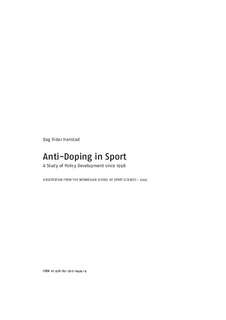Anti-doping in sport : a study of policy development since 1998
Doctoral thesis
Permanent lenke
http://hdl.handle.net/11250/171289Utgivelsesdato
2009Metadata
Vis full innførselSamlinger
Sammendrag
The aim of this study is to analyze in a systematic and critical way the many more or less interconnected processes shaping anti-doping work at different levels since the doping scandal in the Tour de France cycle race in 1998. More specifically, this dissertation is an investigation of anti-doping policies in international sport with a particular emphasis on the power relations between units at different levels. The main research question is: How can the development of anti-doping policy since
1998 be understood? The main theoretical framework is figurational sociology. Norbert Elias introduces the concept of figuration as a way of overcoming the individual–society dichotomy. Sociology should be concerned with viewing the social world as open pluralities of interdependent people bonded together in dynamic constellations. Elias saw game models as a means of isolating in close focus the intertwining of the aims and actions of pluralities of people, thereby making these complex processes more easily understandable The study is comprised of four qualitative case studies. Because of the complexity of the development of anti-doping policy it was necessary to confine the study to some key units and the relationships between them. This was done by picking out one case study at each of the following levels; the global (paper I), international (paper II), national (paper III) and the individual athlete’s level (paper IV). Paper I: Hanstad, D.V., Smith A. & Waddington, I. (2008): The Establishment of the World Anti-Doping Agency: A Study of the Management of Organizational Change and Unplanned Outcomes. International Review for the Sociology of Sport 43 (3) 227-249. Paper II: Hanstad, D.V. (2008): Drug Scandal and Organizational Change within the International Ski Federation. A Figurational Approach. European Sport Management Quarterly 8 (4) 379-398. Paper III: Hanstad, D.V. & Skille, E. (2008): Politicians, bureaucrats and a voluntary sports organization - the power play of Norwegian policy in the case of anti-doping. Sport in Society, 11(5) 546-559. Paper IV: Hanstad, D.V & Loland, S. (2009): Elite level athletes’ duty to provide information on their whereabouts: Justifiable anti-doping work or an indefensible surveillance regime? European Journal of Sport Science 9 (1) 3-10.
Beskrivelse
Avhandling (doktorgrad) – Norges idrettshøgskole, 2009.
